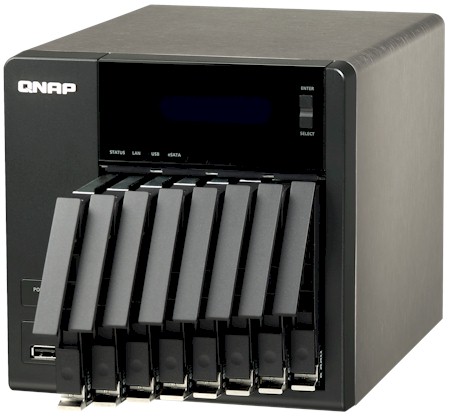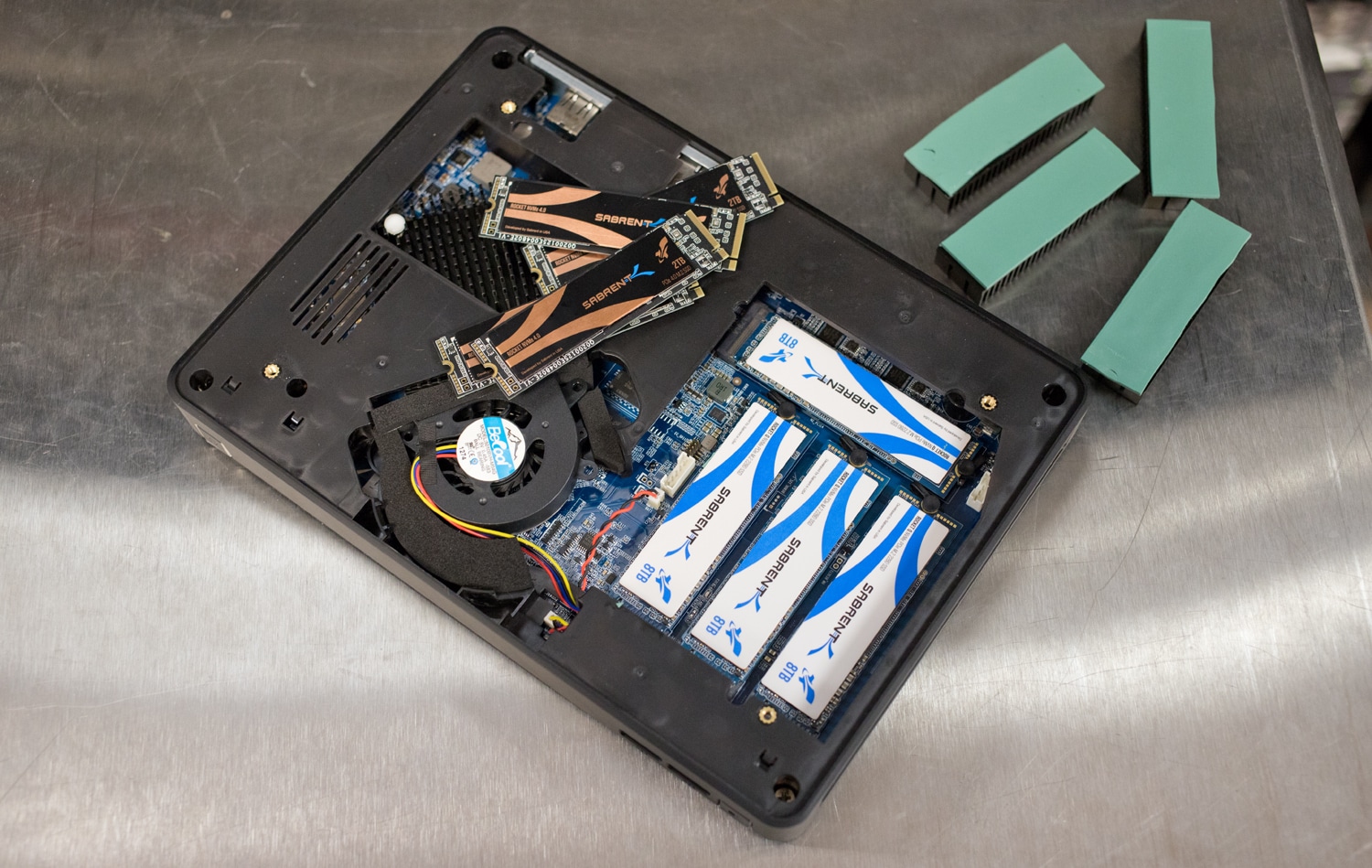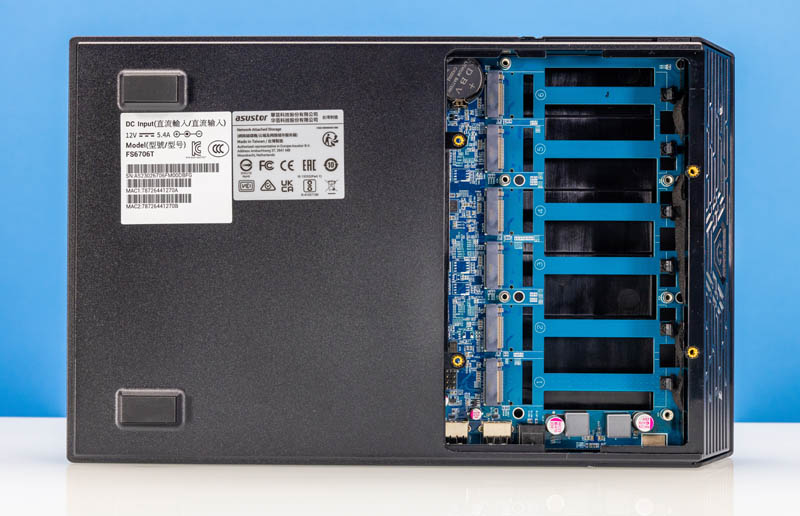-
WANTED: Happy members who like to discuss audio and other topics related to our interest. Desire to learn and share knowledge of science required. There are many reviews of audio hardware and expert members to help answer your questions. Click here to have your audio equipment measured for free!
- Forums
- Audio, Audio, Audio!
- DACs, Streamers, Servers, Players, Audio Interface
- Home Music Servers, Computers and Streamers
You are using an out of date browser. It may not display this or other websites correctly.
You should upgrade or use an alternative browser.
You should upgrade or use an alternative browser.
SSD based NAS
- Thread starter blanc
- Start date
Hi,
are there any mature SSD based NAS solutions on the market? Can this become the mainstream in the future
Can't you use them now?
I have one SSD (for Roon mainly) and 3 spinning hard drives in my Synology.
I guess that depends on your definition of a “mature NAS solution”.
-commercial technology like QNAP, Synology
-open-source technology like TrueNas
-proprietary technology like Unraid
They all work with SSDs.
-commercial technology like QNAP, Synology
-open-source technology like TrueNas
-proprietary technology like Unraid
They all work with SSDs.
SSDs have been around long enough that any NAS today (and probably within the past 5-10 years) should work fine with them. The issues I saw were related more to the SSDs than the RAID controllers -- growing pains. SSDs do have their own set of issues which is why many very large storage arrays still use conventional spinners.
Hi,
are there any mature SSD based NAS solutions on the market? Can this become the mainstream in the future
Several NAS use SSD as a cache for often used data. The SSD being in general faster than spinning HDD, functions like an extension of the RAM. SSD are also used in NAS to deliver data faster, e,g to try to fully use GigE and 10 GigE links ...
For consumer video? 40 Mbits/sec is all you need .. Not Mega BYTES.. Megabits per second Something any <$10 Ethernet Switch can handle at sustained rates, you would never see in consumer environments (or even pro)...
So for consumer 4 K video and audio ? Don't bother. Use regular HDD and be done...
Happy holidays!
Peace.
keithm55
Member
I have been running two all SATA ssd arrays (Synology) at home for at least 10 years. Both arrays are running 4 SATA SSD drives in a RAID 5. The reason I went all SSD at first was to get rid of the drive spindle whine of HDD's (it was driving me crazy).
I have been using samsung pro SATA SSD devices and have not seen any issues in all those years. I was careful to avoid non-mainstream SSD vendors where flash quality and SSD firmware maturity are not well established.
The higher cost of SSD ($/usable capacity) was not so much an issue as my storage capacity requirements could be met with four 4 TB SSD in a RAID 5 configuration.
It is obvious that for most arrays for this class of products, the network connection to a SSD NAS is likely to be the bottleneck to storage, especially for bandwidth sensitive workloads. Some of the NAS solutions will have more than one network connection (and/or higher speed ethernet) to offset this if the workload from all the clients requires it.
Keith
As an aside on storage systems (off topic a bit):
In enterprise storage systems you are trading off $/usable capacity (after RAID), $/random IO's, $/bandwidth, Random IO's/usable capacity, Bandwidth/usable capacity, degraded performance (array performance after the loss of one or more drives) and Mean time to data loss (MTDL).
SSD's usually do better than HDD's in all these metrics except for $/usable capacity where HDD's are better. The design of all SSD, all HDD or hybrid solutions (SSD and HDD) are based on finding the lowest cost solution while meeting the requirements of the workload in how it accesses storage.
Enterprise arrays with SSD's have been around for more than 15 years. Most of the customers I had (I worked 30 years at a very large database company that sold HW/SW solutions before retiring during COVID), switched to SSD only arrays due to performance reasons and to get a better MTDL. To be clear this is comparing high quality enterprise (no consumer grade) HDD's and SSD's. The only remaining use of HDD's (when I retired) was for storing "low value" data (data with much lower access rates - cold data).
I have been using samsung pro SATA SSD devices and have not seen any issues in all those years. I was careful to avoid non-mainstream SSD vendors where flash quality and SSD firmware maturity are not well established.
The higher cost of SSD ($/usable capacity) was not so much an issue as my storage capacity requirements could be met with four 4 TB SSD in a RAID 5 configuration.
It is obvious that for most arrays for this class of products, the network connection to a SSD NAS is likely to be the bottleneck to storage, especially for bandwidth sensitive workloads. Some of the NAS solutions will have more than one network connection (and/or higher speed ethernet) to offset this if the workload from all the clients requires it.
Keith
As an aside on storage systems (off topic a bit):
In enterprise storage systems you are trading off $/usable capacity (after RAID), $/random IO's, $/bandwidth, Random IO's/usable capacity, Bandwidth/usable capacity, degraded performance (array performance after the loss of one or more drives) and Mean time to data loss (MTDL).
SSD's usually do better than HDD's in all these metrics except for $/usable capacity where HDD's are better. The design of all SSD, all HDD or hybrid solutions (SSD and HDD) are based on finding the lowest cost solution while meeting the requirements of the workload in how it accesses storage.
Enterprise arrays with SSD's have been around for more than 15 years. Most of the customers I had (I worked 30 years at a very large database company that sold HW/SW solutions before retiring during COVID), switched to SSD only arrays due to performance reasons and to get a better MTDL. To be clear this is comparing high quality enterprise (no consumer grade) HDD's and SSD's. The only remaining use of HDD's (when I retired) was for storing "low value" data (data with much lower access rates - cold data).
Last edited:
keithm55
Member
Be careful in using low quality (low numbers in drive writes per day or total bytes written type specs) SSD as a cache. The ratio of writes to read in a SSD as a cache application are often much higher than what the workload exhibits.Several NAS use SSD as a cache for often used data. The SSD being in general faster than spinning HDD, functions like an extension of the RAM. SSD are also used in NAS to deliver data faster, e,g to try to fully use GigE and 10 GigE links ...
For consumer video? 40 Mbits/sec is all you need .. Not Mega BYTES.. Megabits per second Something any <$10 Ethernet Switch can handle at sustained rates, you would never see in consumer environments (or even pro)...
So for consumer 4 K video and audio ? Don't bother. Use regular HDD and be done...
Happy holidays!
Peace.
if your workload is accessing a larger % of your total storage data or is dominated by sequential streams, then there are a lot of cache writes for future reads that may not happen. This may wear out the SDD faster than expected as even read dominated workloads generate writes to the cache SSD. Some array firmware is smart to limit SSD cache fills when sequential streams are detected. Obviously SSD cache helps with bursty write workloads.
If there is not a lot of locality in the workload (like multiple sequential streams of different data concurrently; probably not in most home use cases), you end up running at the rate you can fill the SSD cache off of the HDD (also any constraints in network connection performance may limit this).
Last edited:
The new routers all support larger than 4tb hard drives, so plugging an external USB SSD is really simple. I use an Asus 1100x tri band with a 12tb hard drive and get 108MB/sec. I looked at NAS but just didn't add up for sharing media in the house, so upgraded the router and installed Merlin firmware instead.

Is A 2.5" NAS For You? - SmallNetBuilder
http://forums.smallnetbuilder.com/showthread.php?t=2212
 www.smallnetbuilder.com
www.smallnetbuilder.com
like this?
i dont see anything wrong with this
as long as you can eat the cost of 2 to 4tb (or MORE!) sata ssds
fanless is an ask and to me i'd like something like a barebones NUC pc that has 4 or more 2.5 bays
i think it really doesnt matter since your data is flying over network and any speed you get from nvme ssd is lost
i'm not aware of any easlly available 3.5 ssds except enterprise and i'm guess you aint going there
so just get reasonable brands 2.5 sata eg. Crucial BX/MX500 2tb ssd
something like a pair of these should be $250 usd? $300?
i personally go for any small nuc type pc, usff that has two sata slots of use freenas or open nas something like that
i'm not aware of any easlly available 3.5 ssds except enterprise and i'm guess you aint going there
so just get reasonable brands 2.5 sata eg. Crucial BX/MX500 2tb ssd
something like a pair of these should be $250 usd? $300?
i personally go for any small nuc type pc, usff that has two sata slots of use freenas or open nas something like that
- Thread Starter
- #14
Can a streamer access this USB SSD just like a conventional NAS? How much power does it consume when not in use?The new routers all support larger than 4tb hard drives, so plugging an external USB SSD is really simple. I use an Asus 1100x tri band with a 12tb hard drive and get 108MB/sec. I looked at NAS but just didn't add up for sharing media in the house, so upgraded the router and installed Merlin firmware instead.
Patrick from STH today has released a new review of a fanless mini computer.
Server:
-Processor: Intel Atom C3758
-NIC: 4x 10GbE SFP+ and 5x Intel i225V 2.5GbE LAN
-RAM: Extra
-HD/SSD: Extra
-Retails for US$286 for server without RAM or HD (aliexpress)
To add a NAS to this sever:
-You can add a JBOD, like the recommended QNAP TL-D400S.
-Retails for US$300 (amazon.com)
-Since you have 4 bays (2.5" or 3.5"), you can buy either SSDs or HDs (since both are supported).
-Note that there is a fan on the back, but that can be disabled manually for a fully fanless setup (with SSDs inside)
-Note: This JBOD includes the QNAP QXP-400eS-A1164 (link), which can be purchased separately for US$69, in case you wish another JBOD from QNAP, but this adapter only supports 4 HD bays.
Software:
- Install Proxmox (open-source hypervisor)
- Install OPNsense or Pfsense (both open-source firewalls) as a VM inside proxmox
- Install TrueNAS (open-source NAS) as a VM inside proxmox
How to hook it up to PC?
-To hookup this server to your desktop computer, get a cheap 10GbE SPF+ NIC, like this for US$40. Consider Mellanox if you need more reliable vendor.
-For cable, you can get a SFP+ to SFP+ Direct Attach Copper (DAC) cable for US$17 like this for 1m. You can also get a Fiber Optic cable, which costs more, but is much smaller than the DAC cable, for US$27 like this for 1m.
So for US$600 (excluding the cost of HDs/SSDs), you have 10GbE capable NAS and firewall. Hard to beat that.
Optional:
-For wifi, purchase Ubiquiti Access Points, which start at US$100 for Wifi 6.
Server:
-Processor: Intel Atom C3758
-NIC: 4x 10GbE SFP+ and 5x Intel i225V 2.5GbE LAN
-RAM: Extra
-HD/SSD: Extra
-Retails for US$286 for server without RAM or HD (aliexpress)
To add a NAS to this sever:
-You can add a JBOD, like the recommended QNAP TL-D400S.
-Retails for US$300 (amazon.com)
-Since you have 4 bays (2.5" or 3.5"), you can buy either SSDs or HDs (since both are supported).
-Note that there is a fan on the back, but that can be disabled manually for a fully fanless setup (with SSDs inside)
-Note: This JBOD includes the QNAP QXP-400eS-A1164 (link), which can be purchased separately for US$69, in case you wish another JBOD from QNAP, but this adapter only supports 4 HD bays.
Software:
- Install Proxmox (open-source hypervisor)
- Install OPNsense or Pfsense (both open-source firewalls) as a VM inside proxmox
- Install TrueNAS (open-source NAS) as a VM inside proxmox
How to hook it up to PC?
-To hookup this server to your desktop computer, get a cheap 10GbE SPF+ NIC, like this for US$40. Consider Mellanox if you need more reliable vendor.
-For cable, you can get a SFP+ to SFP+ Direct Attach Copper (DAC) cable for US$17 like this for 1m. You can also get a Fiber Optic cable, which costs more, but is much smaller than the DAC cable, for US$27 like this for 1m.
So for US$600 (excluding the cost of HDs/SSDs), you have 10GbE capable NAS and firewall. Hard to beat that.
Optional:
-For wifi, purchase Ubiquiti Access Points, which start at US$100 for Wifi 6.
Last edited:
Or do it without a JBOD and use the in-built 2x M.2 for SSD & 1x 2.5-inch HDD/SSD of the mini computer.To add a NAS to this sever:
-You can add a JBOD, like the recommended QNAP TL-D400S.
As to SSD based NAS solutions or rather NVME based ones I found some examples:

 www.storagereview.com
www.storagereview.com

 www.servethehome.com
www.servethehome.com
By the way: both seem to have fans. Not sure how noiseless they are new or will be when they age.
Quoting https://www.asustor.com/en-gb/product?p_id=79 "The Flashstor series come with S/PDIF over TOSLINK. Enjoy high quality sound with S/PDIF combined with Roon or High-Res Player for an unmatched audio experience."

QNAP TBS-464 Mini All-Flash NAS Review
Though the QNAP TBS-464 isn’t inexpensive, especially after adding drives, it can easily pay for itself as a portable storage device.

A Quick Look at the Asustor Flashstor 6 FS6706T NAS
We take a quick look at the Asustor Flashstor 6 FS6706T. This is a 6x M.2 NVMe SSD NAS with two 2.5GbE NICs for a SMB all-flash NAS
By the way: both seem to have fans. Not sure how noiseless they are new or will be when they age.
Quoting https://www.asustor.com/en-gb/product?p_id=79 "The Flashstor series come with S/PDIF over TOSLINK. Enjoy high quality sound with S/PDIF combined with Roon or High-Res Player for an unmatched audio experience."
Last edited:
Similar threads
- Replies
- 14
- Views
- 2K
- Replies
- 17
- Views
- 1K
- Replies
- 90
- Views
- 5K
- Replies
- 26
- Views
- 2K
- Replies
- 2
- Views
- 472
